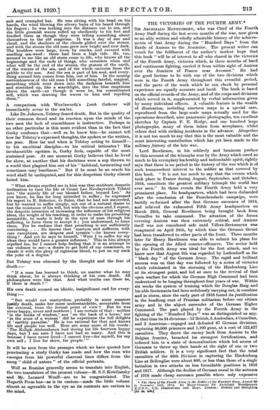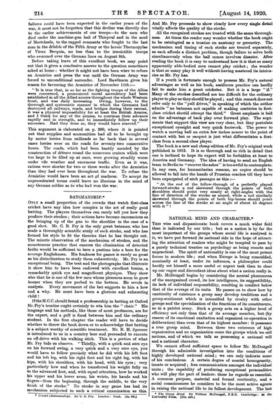THE VICTORIES OF THE FOURTH ARMY.* Sin ARCHIBALD MONTGOMERY, who
was Chief of the Fourth Army Staff during the last seven months of the war, now gives us an ably written and wholly admirable history of the achieve- ments of that Army during the " Hundred Days " from the Battle of Amiens to the Armistice. The present writer can vouch for the fulfilment of the author's modest hope that this book " will be of interest to all who shared in the victories of the Fourth Army, victories which, in three months of hard and continuous fighting, carried it from within sight of Amiens over the frontiers of France near Avesnes." He had the good fortune to be with one of the two divisions which were in the Fourth Army throughout this eventful period, and the parts of the work which he can check by personal experience are equally accurate and lucid. The book is based on the official records of the Army, and of the corps and divisions which served in it, supplemented by verbal information given by many individual officers. A valuable feature is the wealth of illustration, including nineteen maps in a special case, reproduced from the large-scale maps actually used for the operations described, nine panoramic photographs, ten excellent sketches by Captain F. E. Hodge, and one hundred large photographs, many of them taken from aeroplanes, whilst others deal with striking incidents in the advance. Altogether it is not too much to say that this is the most valuable and the most interesting contribution which has yet been made to the military,history of the late war.
Lord Rawlinson, in his soldierly and luminous preface to this account of the triumphs won by the Army which owed so much to his exemplary leadership and indomitable spirit, rightly says that there is no period in the history of the war which is of such transcendent interest to the soldier as that covered by this book. " It is not too much to say that the events which took place in France during August, September, and October, 1918, constitute the greatest military triumph the world has ever seen." In those events the Fourth Army held a very prominent place. Its headquarters, which had been disbanded after the conclusion of the Passchendaele campaign, were hastily re-formed after the first German successes of 1918, and relieved the exhausted Fifth Army headquarters on March 28th, General Rawlinson being brought back from Versailles to take command. The situation of the forces covering Amiens was then extremely critical, and Amiens itself was not considered safe until Villers-Bretonneux was recaptured on April 24th, by which time the German thrust had been transferred to other parts of the front. Three months later Sir Henry Rawlinson was able to submit his plans for the opening of the Allied counter-offensive. The sector held by the Fourth Army was ideal for the first attack, and we know now that August 8th was regarded by Ludendorff as the " black day " of the German Army. The rapid and brilliant success won on that day was followed by a series of victories which culminated in the storming of the Hindenburg Line at its strongest point, and led at once to the revival of that open warfare for which the German High Command had been understood to be longing throughout four years of war. Within six weeks the system of training which Sir Douglas Haig and his able lieutenants had been sedulously carrying out, in sunshine and in storm, since the early part of 1916 found its justification in the headlong rout of Prussian militarism before our citizen army and in the abject surrender of the German Higher Command. The part played by the Fourth Army in the fighting of the " Hundred Days " was as distinguished as any. In that time its 24 divisions-12 British, 5 Australian, 4 Canadian, and 3 American—engaged and defeated 67 German divisions, capturing 80,000 prisoners and 1,100 guns, at a cost of 122,427 casualties. They drove the enemy back from Amiens to the Belgian frontier, breached his strongest fortifications, and reduced him to a state of demoralization which led scores of Germans to throw up their bands at the sight of one or two British soldiers. It is a very significant fact that the total casualties of the 46th Division in capturing the Hindenburg Line at Bellenglise were about 800, or less than those of a single battalion in two attacks on less formidable positions in 1916 and 1917. Although the decline of German moral in the autumn of 1918 made cheap successes possible where only expensive • The Story of the Fourth Army In the Bottler of the Hundred Dam August 80 to Norenew llth. 1918. By Major-General Sir Archibald Montgomery K.C.M.G., C.B. Illustraeons and Mann.. London: Hodder and Stoughton 10$ Sa. net..3
failures could have been expected in the earlier years of the war, it must not be forgotten that this decline was directly due to the earlier achievements of our troops—to the men who died under the machine-gun hail of Thiepval and in the mud of Meetcheele, to the ragged remnants who fought to the last man in the debdcle of the Fifth Army or the heroic Thermopylae of Vieux Berquin, no less than to the irresistible troops who swarmed over the German lines on August 8th.
Before taking leave of this excellent book, we may point out that it gives a conclusive answer to the question sometimes asked at home : whether it might not have been wiser to refuse an Armistice and press the war until the German Army was forced to unconditional surrender. Lord Rawlinson gives his reason for favouring the Armistice of November 1 lth:—
" It is true that, in so far as the fighting troops of the Allies were concerned, a pronounced moral ascendency had been established in all the Allied armies throughout the whole Western front, and was daily increasing. Owing, however, to the thorough and systematic manner in which the Germans had destroyed all railways, roads, and bridges during their retreat, it was a physical impossibility for at least the British Armies, and I think for any of the armies, to continue their advance rapidly and in strength, and to immediately follow up their successes. Had they done so, they would have starved."
This argument is elaborated on p. 260, where it is pointed out that supplies and ammunition had all to be brought up by motor lorries from railheads so far back that in several cases lorries were on the roads for seventy-two consecutive hours. The roads, which had been hastily mended by the construction of detours round the numerous craters which were too large to be filled up at once, were growing steadily worse under vile weather and enormous traffic. Even as it was, rations were shorter for two or three weeks after the Armistice than they had ever been throughout the war. To refuse the Armistice would have been an act of madness. To accept its unprecedented terms could leave no illusions in the mind of any German soldier as to who had won the war.



































 Previous page
Previous page